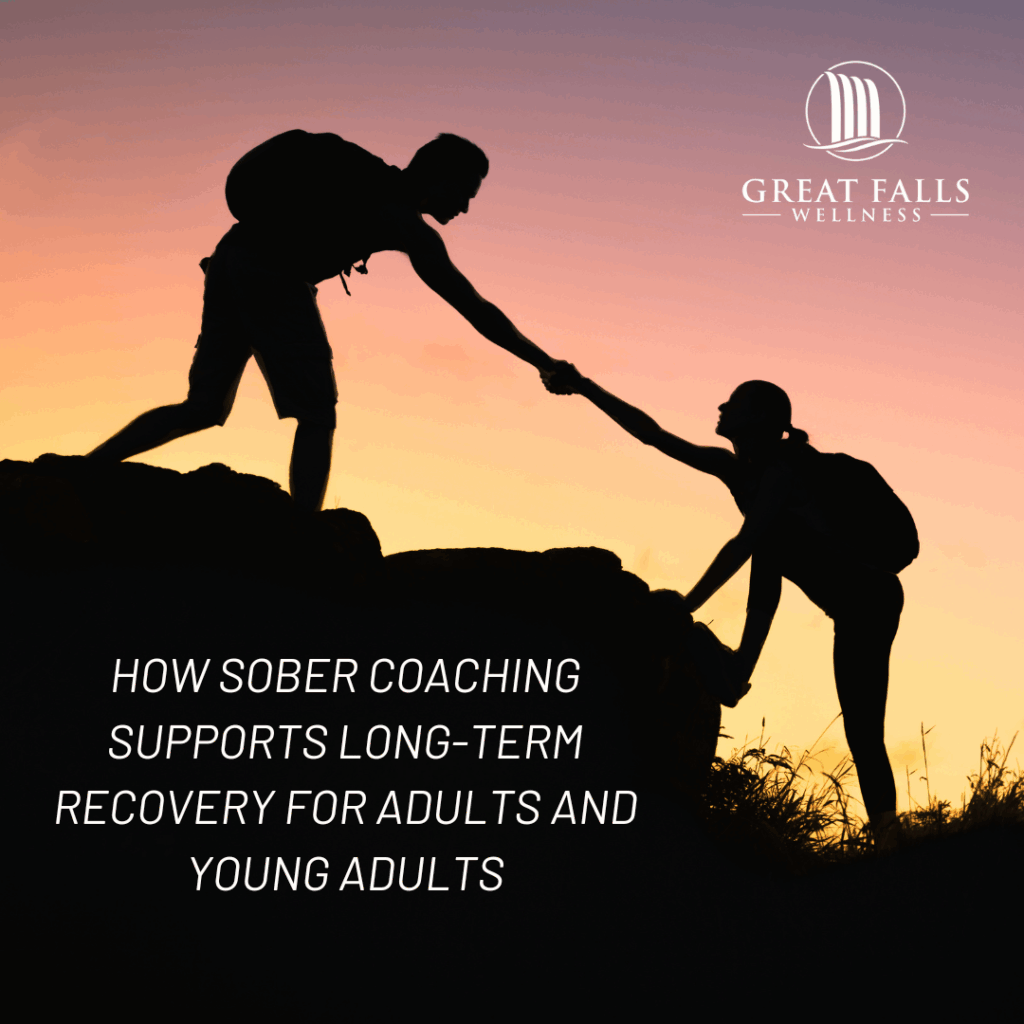
Sober coaching has become a valuable part of addiction recovery, bridging the gap between formal addiction care and real-life applications. Also known as recovery coaching, sober coaching supports people as they transition from treatment into long-term sobriety. This support can be especially helpful for both adults and young adults facing daily challenges after in-patient rehab and during or after outpatient addiction care.
What Is Sober Coaching?
Sober coaching pairs individuals in recovery with trained peers who may or may not be healthcare professionals. These coaches provide guidance, support, and accountability outside of clinical settings. A sobriety coach does not replace therapy or treatment. Instead, they help bridge the gap between formal care and daily sober living. A sober coach can be part of a plan for addiction treatment for professionals, for students, for retired people, for emerging adults, or for anyone who wants to maximize their chances.
Recovery coaches may have lived experience or a sober coach certification. Often but not always, they are men and women in recovery from addiction themselves. They help clients manage triggers, create structure, and stay committed to recovery goals. If you’ve wondered, “What is a recovery coach?,” it’s someone who understands addiction and helps others move forward.
Recovery coaching can take many forms. Some coaches work one-on-one with clients for structured sessions. Others may offer real-time support by text or phone, helping navigate high-risk situations as they happen. The flexibility and practical nature of sober coaching make it a valuable part of many recovery plans.
The Benefits of Sober Coaching
A certified recovery coach can offer personalized support. They focus on strengths, encourage progress, and provide guidance during setbacks.
Some common benefits include:
- Accountability in everyday situations
- Help with cravings and emotional triggers
- Support when facing tough decisions
- Introduction and accompaniment to 12 step groups and meetings
- Help building and maintaining a sober network
- Encouragement to maintain recovery goals
- Real-time problem-solving when challenges arise
Peer support has been shown to improve outcomes for individuals in both inpatient and outpatient treatment settings. It can help people stay engaged in treatment, reduce relapse risks, get connected to care more quickly, avoid returning to rehab, and for individuals with criminal backgrounds, recovery coaching can even reduce the risk of reoffending.
Sober coaches can also help clients build confidence. For many, early recovery includes moments of doubt and uncertainty. Having someone to check in with can reduce isolation and provide a sense of stability.
Why Sober Coaching Is an Important Part of a Broader Treatment Plan
Sober coaching works best as part of a larger treatment plan. In an Intensive Outpatient Program (IOP), for example, coaching supports clinical and group therapy work. At Great Falls Wellness, clients benefit from addiction treatment groups, family therapy, and clinically proven holistic therapies including equine therapy. A sober coach helps apply what is learned in those settings to everyday life.
Here’s an example of how a coach may help you in your addiction treatment: You might learn about a number of coping tools in a group session. Your coach can help you use those tools at work or during stressful moments at home. That practical application makes recovery strategies stick.
In addition to applying new skills, sober coaching helps maintain consistency. Therapy sessions or outpatient groups may occur multiple days per week, depending on your level of care, but recovery challenges often arise in between. Sober coaches can offer regular, scheduled sessions and availability between meetings to provide support when it’s most needed.
Learn more about our sober coaching approach here.
How Sober Coaching Differs from Therapy and Support Groups
Therapy helps people explore their past and emotional health. Sober coaching focuses on the present and future in a relatable way. Sober coaches are often relatable because they speak from personal experience, offering guidance rooted in firsthand knowledge of recovery. They’re also relatable because they work with you one-on-one, getting to know your story, your struggles, and what support actually works for you.
Support groups provide community and shared experience. A sobriety coach offers individual attention and custom strategies. Coaching works alongside therapy and support groups, but it fills a different role.
Coaches do not diagnose or treat mental health conditions. Instead, they help clients set and reach goals related to recovery. They may help organize daily routines, plan responses to high-risk situations, or offer structure during transitions. This action-based focus sets sober coaching apart from traditional clinical roles.
How Sober Coaching Helps Prevent Relapse
Relapse often happens when stress builds or support fades. A peer recovery coach can help spot warning signs before things worsen.
Sober coaches provide check-ins and ongoing support. This flexible connection means someone is available when you need them most. It adds another layer of accountability and care.
A growing body of research supports the value of peer and recovery coaching in addiction care. For example, one study found that peer support can reduce substance use, improve treatment adherence, and even lower rates of readmission and criminal behavior recidivism. “The evidence reviewed here also suggests peer supports may have the ability to improve outcomes for individuals engaged in inpatient or outpatient psychiatric treatment for SUD and co-occurring mental disorders. In such contexts peer supports have been shown to reduce substance use, lead to better SUD and medical treatment adherence, get individuals to SUD treatment faster following SUD treatment referral, reduce the frequency of inpatient readmission, and reduce criminal behavior recidivism.” (Kane et al., 2024)
Recovery is not linear. People in recovery may face unexpected challenges at work, in relationships, or with health. A coach can help clients respond rather than react, offering tools that protect sobriety in real time. This can be critical during holidays, social events, or life changes.
What to Expect from a Session
Sessions are shaped by your recovery goals. They often include:
- Progress check-ins
- Discussion of challenges and stressors
- Weekly planning and support strategies
- Encouragement and skill-building
You might meet in person, over the phone, or on video. Some programs also offer sober companions who stay with clients during high-risk times.
Coaches often collaborate with clinical teams or family members (with client consent). This coordination can improve overall care and ensure consistency across all areas of support.
Sessions may also evolve over time. Early recovery may involve frequent meetings, while long-term recovery may shift to less frequent check-ins or as-needed support.
How to Choose the Right Sober Coach
Recovery coaches vary in background and approach. Some have lived experience, some have professional credentials, and many have both.
When searching to find a sober coach, consider these questions:
- Are they certified?
- Do they understand your stage of recovery?
- Can they meet you where you are emotionally and practically?
If you’re currently in inpatient treatment, your counselor or discharge coordinator may be able to provide you with a list of trusted sober coach referrals. If you’re enrolled in an outpatient treatment program, like Great Falls Wellness, recovery coaching may be available through your program. At Great Falls Wellness, our sober coaches are experienced professionals with a deep understanding of addiction and recovery. They assess each individual’s needs and can be available for you at the level you need, whether that’s weekly, biweekly, or even daily.
If you’re not near Great Falls Wellness in the Greater Washington DC area or Northern Virginia, look for local sober coaches that are certified, trained in evidence-based recovery strategies, and have the flexibility and accessibility you need to support your goals in recovery.
Why Sober Coaching Is Key for Lasting Recovery
Sustained recovery requires long-term support. A certified recovery coach can help people maintain focus, navigate challenges, and continue to grow.
Recovery does not end after treatment. It continues through daily choices, habits, and support systems. A sober coach helps build structure and accountability that supports a healthy, sober life.
By reinforcing the lessons learned in treatment and helping clients turn those lessons into daily practices, recovery coaches play a central role in long-term sobriety. They are not a replacement for therapy or group support, but an important complement to both.
Recovery is deeply personal. A sober coach helps tailor the process to the individual— offering practical tools, encouragement, and a steady presence during uncertain times.
Works Cited
Kane, M. T., Powell, E. A., Carroll, A. D., Monteiro, J. L., Rodriguez, W., Casado, E., Chang, T. E., & Wakeman, S. E. (2024). Recovery coach program implementation across an integrated health system. Psychiatric Services, 75(11), 1176–1179. https://doi.org/10.1176/appi.ps.20230526



